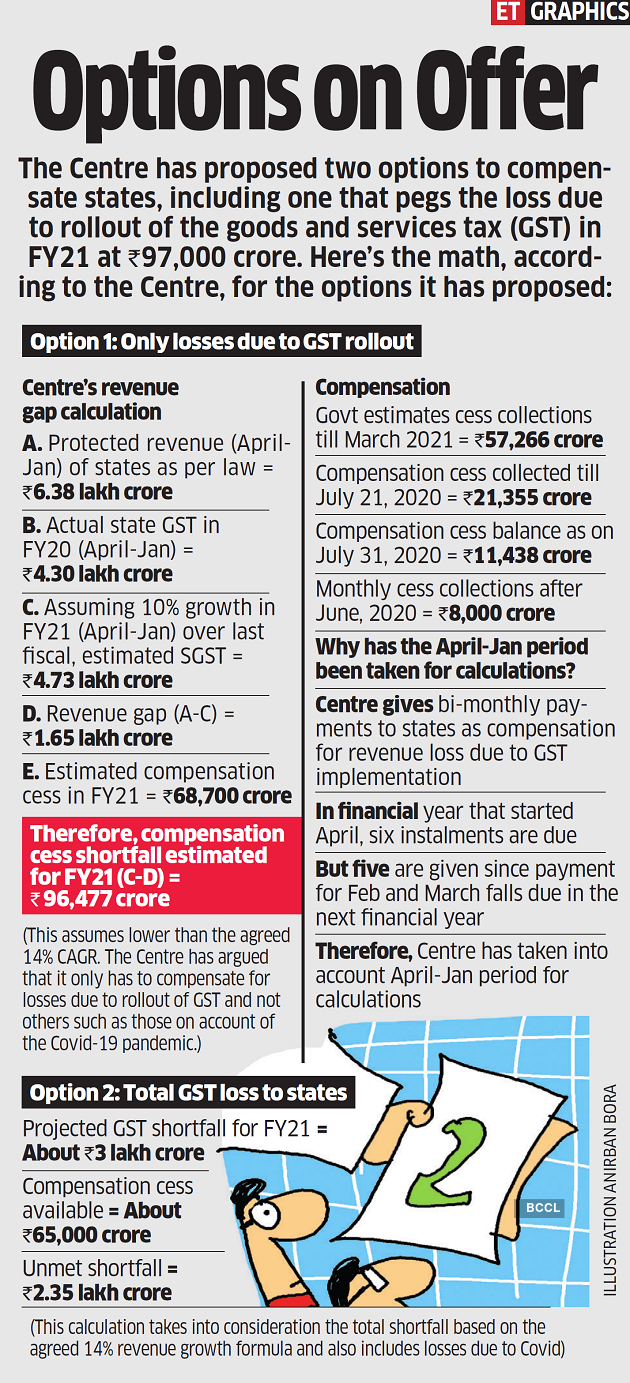NEW DELHI: Opposition-ruled states will seek Prime Minister Narendra Modi’s intervention on the issue of the goods and service tax shortfall compensation, unhappy with the Centre’s offer of two borrowing options.
Andhra Pradesh, Tamil Nadu and Odisha are likely to join Delhi, Punjab, Kerala, West Bengal, Chhattisgarh, Jharkhand, Maharashtra, Rajasthan and Puducherry in rejecting the options and asking the Centre instead to borrow and compensate the states.
“At least a dozen chief ministers will write to the Prime Minister individually… Kerala will be sending a letter tomorrow,” Kerala finance minister Thomas Isaac told ET after the opposition-led and allied states met via videoconferencing and collectively decided they will not borrow.
“Andhra Pradesh, Tamil Nadu and Odisha had taken strong position in the Council (opposing the proposals) … we hope they would also join,” he added.
The states will hold further talks after meeting the finance secretary and expenditure secretary on Tuesday to clarify the Centre’s offers.
One of the options offered on Thursday was for the states to borrow Rs 97,000 crore from a special central bank facility to make up the shortfall due to the transition to the GST regime, with repayment of the principal and interest to be serviced by the compensation cess.
The alternative is to borrow Rs 2.35 lakh crore, the estimated shortfall on account of the GST transition and the Covid-19 induced slowdown, from the market, facilitated by the Centre and RBI. However, the states would bear the interest burden while the principal would be serviced by the compensation cess, which is levied on sin and luxury products such as cigarettes and specified categories of automobiles.
Tamil Nadu chief minister Edappadi K Palaniswami wrote to the PM on Monday, asking him to direct the finance ministry to revisit its stance on GST compensation.
“States are being required to borrow from the market… is administratively difficult to implement and more expensive. Further, the reasons being cited for such an arrangement are not persuasive,” he said, seeking unpaid dues of Rs 12,250.5 crore.
Punjab and Chhattisgarh ministers wrote to finance minister Nirmala Sitharaman, reiterating that the onus of borrowing should not be put on the states.
“If it comes to that, we will take legal opinion, but we would like that decision is taken by consensus since it’s a delicate matter and the entire federal structure is at stake,” said Chhattisgarh commercial tax minister TS Singh Deo. State chief minister Bhupesh Bhagel asked Sitharaman to provide Rs 2,828 crore of unpaid dues owed to the state.
Punjab sought clarity on many matters including whether attorney general KK Venugopal’s opinion on compensation cess provided to the states was based on inadequate information.
State finance minister Manpreet Badal pointed to the minutes of the 8th and 10th Council meetings where it was discussed that the Central government could raise resources by other means, including market borrowing, for compensation and this could then be recouped by continuation of cess beyond five years. However, this was not incorporated in the law.
“In view of the assurance given by the secretary to the Council, the Council agreed not to insist on the legal change. This implies that the decisions of the Council were to be treated as having the force of the law,” he noted.

If this was not brought to the notice of the AG, then his opinion “is based on inadequate material and shouldn’t even have any persuasive value,” Badal said.
The AG had said the Centre was not liable to make good the shortfall in GST revenue and that the GST Council would decide on ways to meet the shortfall. It added that the Council could recommend that the Central government allow states to borrow money as a measure of meeting the compensation gap.
Badal questioned the reduction in compensation since it cannot be increased or decreased without amending the GST Compensation Act. The act and the Centre’s suggestion of allowing states to borrow were contrary to each other, Badal said, adding that as per the act, all resources are first credited to the compensation fund and then disbursed to states.
“How can money borrowed by a state be credited to the compensation fund?” he asked.
Badal sought clarity on the compensation calculation for the period after January 2021, especially since it was not clear when the impact of Covid-19 would abate. He said that till the end of 2021-22, the revenue loss would exceed Rs 4.5 lakh crore.
“With interest, this would require more than 4-5 years to repay, rather than 2-3 years,” he said.
Badal questioned the basis on which the loss due to GST implementation was calculated – assuming 10% growth over the previous year and attributing the rest to the Covid-19 pandemic – especially when revenue growth in FY20 was at 4% and GDP growth in the fourth quarter had slowed.
“This makes the whole exercise of calculating loss arbitrary, one-sided and devoid of any legal justification,” he said. He asked whether the Constitution allowed differentiation in revenue loss as stated by the Centre in the two options – of Rs 97,000 crore and Rs 2.35 lakh crore.
Source : Financial Express
